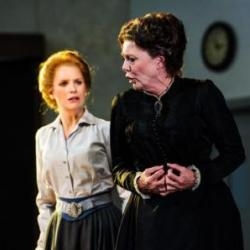The Turn of the Screw (Holland Park)
Benjamin Britten’s ghost opera brings shivers to a warm summer evening

© Alex Brenner
Opera Holland Park has lavished immense care on its first-ever staging of a Britten opera, and from a musical standpoint it's a humdinger. Rarely can this masterwork have been better sung.
A stripped-back City of London Sinfonia brought dynamism to the drama under the composer’s former protégé, Steuart Bedford (who conducted the première of Death in Venice back in 1973). Bedford favoured slowish speeds yet his reading was never less than taut as he burrowed into the score, eschewing lyricism and plucking out telling details to accentuate the eeriness.
If a ‘but’ seems to be lurking, that’s down to Annilese Miskimmon‘s directorial concept. Yet again in a Britten production we find ourselves in a schoolroom. It’s practically de rigueur these days – Richard Jones, Christopher Alden and more recently Neil Bartlett (with Owen Wingrave) have all toyed with psycho-sexual goings-on in the classroom – but it’s becoming a tired old trope.
There is a certain justification for it here, though, because Miskimmon’s Bly, deftly designed by Leslie Travers and eerily lit by Mark Jonathan, is now a nineteen-fifties prep school – and the opera’s flashback tale is itself a haunting. The Prologue (an excellent Robin Tritschler) is a teacher; but what are we to make of his eight small charges, except that they march on and off, shift the odd scene and fade out of the picture during act two? One of them stops from time to time and holds Tritschler’s gaze in a manner I imagine is supposed to be unnerving, but in truth the latterday stuff is a distracting accretion that the director fails to embed convincingly.
"A thousand frayed emotions"
When the past takes centre stage we’re on safer ground. Miskimmon’s care with the text is palpable: she hides Miles under a desk to overhear the letter announcing his expulsion from school, thus making good sense of the boy’s later references to himself as 'bad'. During the schoolroom scene in which Miles sings his strange ‘Malo’ song, Flora – unnoticed by the Governess, who constantly ignores her – traces an ecstatic wall dance. The spirits of Peter Quint and Miss Jessel are everywhere.
Rosie Lomas was an exceptional Flora, an adult singer yet utterly childlike and an actress who hinted at a thousand frayed emotions. She was matched by the assured Miles of young Dominic Lynch, on whose chest the word ‘Malo’ appears in mirror-writing (whether his own or Quint’s we cannot be sure).
Both children had red hair, as did Brenden Gunnell‘s corporeal, cigarette-smoking Quint in a quiet implication of some dubious parentage. They all, along with Diana Montague‘s necessarily straightforward Mrs Grose and Elin Pritchard‘s dark, brooding Miss Jessel, sang with exemplary clarity and concern for interpretational nuance.
In the central role of the Governess Ellie Laugharne suffered from being puzzlingly underdirected, as though Miskimmon wasn’t especially interested in her story’s heroine. It is certainly not the young soprano’s fault that she became a cipher at the heart of her own story.
A flawed triumph, then, but OHP’s polished staging of this creepiest (on several levels) of operas is still a notable achievement and definitely worth catching. Afterwards, please, let’s have a moratorium on schoolroom Britten.












